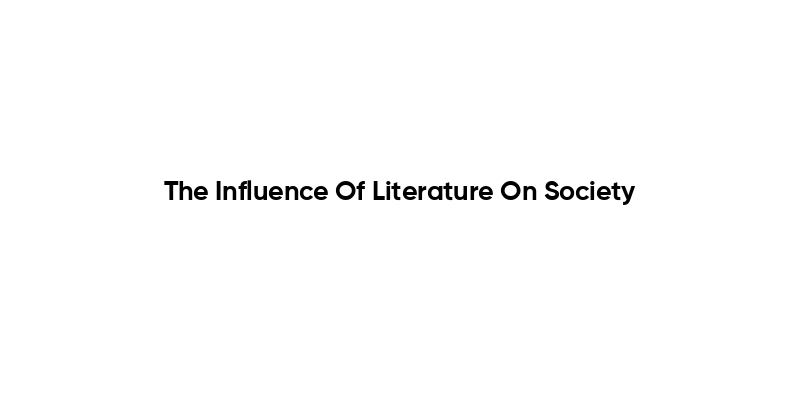Literature has long been a powerful force in shaping society, influencing cultural norms, values, and beliefs. The influence of literature on society extends beyond mere entertainment; it serves as a mirror reflecting the complexities of human experience. Through various genres, from poetry to novels, literature has the ability to provoke thought, inspire change, and foster empathy among readers. This article delves into the intricate relationship between literature and society, exploring how written works can challenge societal norms and inspire movements for social justice.
In the following sections, we will examine key historical examples of literature that have significantly impacted social change, highlighting works that have sparked revolutions and redefined cultural landscapes. You will discover how authors like George Orwell and Harper Lee used their narratives to address pressing social issues, encouraging readers to question the status quo. Additionally, we will explore the role of contemporary literature in addressing modern challenges, such as inequality and environmental concerns, demonstrating that the power of the written word remains relevant in today’s world.
As you continue reading, you will gain insights into the mechanisms through which literature influences public opinion and shapes collective consciousness. We will also discuss the importance of literary education in fostering critical thinking and empathy among individuals. Join us on this enlightening journey to uncover the profound impact literature has on society and why it remains an essential component of our cultural fabric.
Literature as a Reflection of Society
Literature often serves as a mirror to society, reflecting its values, beliefs, and struggles. Through various genres, authors capture the essence of their times, providing readers with insights into the social dynamics and cultural contexts of different eras. For instance, the works of Charles Dickens highlight the plight of the poor in Victorian England, while the Harlem Renaissance literature showcases the African American experience during the early 20th century.
This reflective nature of literature not only documents historical events but also influences societal perceptions. By presenting characters and narratives that resonate with readers, literature can challenge prevailing norms and inspire change. As readers engage with these stories, they may develop a deeper understanding of social issues, fostering empathy and encouraging activism.
Literature as a Tool for Social Change
Throughout history, literature has played a pivotal role in advocating for social change. Authors like George Orwell and Harriet Beecher Stowe used their writings to address pressing social issues such as totalitarianism and slavery, respectively. Their works not only raised awareness but also mobilized public opinion, leading to significant societal shifts.
Moreover, contemporary literature continues to address modern social issues, including gender equality, racial injustice, and environmental concerns. By engaging with these themes, authors can inspire readers to reflect on their own beliefs and actions, ultimately contributing to a more informed and active society. Literature thus becomes a powerful catalyst for social transformation, encouraging individuals to question the status quo and strive for a better future.
The Role of Literature in Shaping Identity
Literature plays a crucial role in shaping individual and collective identities. Through storytelling, readers can explore diverse perspectives and experiences, which can lead to a greater understanding of their own identities. For instance, immigrant literature often highlights the challenges and triumphs of navigating multiple cultures, allowing readers to connect with their heritage or understand the experiences of others.
This exploration of identity is particularly important in a globalized world where cultural exchanges are prevalent. Literature provides a space for marginalized voices to be heard, fostering a sense of belonging and community. As readers engage with these narratives, they may find validation in their experiences or gain insights into the complexities of identity formation.
Literature and Emotional Intelligence
Engaging with literature can significantly enhance emotional intelligence, as it encourages readers to empathize with characters and their experiences. By immersing themselves in different narratives, readers develop a deeper understanding of human emotions and relationships. This emotional engagement can lead to improved interpersonal skills and a greater capacity for empathy in real-life situations.
Studies have shown that reading fiction, in particular, can enhance one’s ability to recognize and understand emotions in others. This skill is essential for building meaningful connections and fostering a compassionate society. As literature continues to explore the complexities of human emotions, it remains a vital tool for personal growth and social cohesion.
The Impact of Digital Literature on Society
The rise of digital literature has transformed the way we consume and engage with written works. E-books, online articles, and social media platforms have made literature more accessible than ever, allowing diverse voices to reach a global audience. This democratization of literature has the potential to challenge traditional publishing norms and promote underrepresented authors.
Furthermore, digital literature encourages interactive engagement, enabling readers to participate in discussions and share their interpretations. This shift not only enhances the reading experience but also fosters a sense of community among readers. As digital literature continues to evolve, its influence on society will likely grow, shaping cultural conversations and expanding the boundaries of literary expression.
Literature has played a significant role in shaping societies throughout history. It serves as a reflection of cultural values, social norms, and human experiences. This table summarizes the key influences of literature on society.
| Influence | Description |
|---|---|
| Social Change | Literature often highlights social issues, inspiring movements for change and reform. Works like “Uncle Tom’s Cabin” by Harriet Beecher Stowe played a crucial role in the abolitionist movement. |
| Cultural Identity | Literature helps to preserve and promote cultural identity. It allows communities to express their unique experiences and traditions, fostering a sense of belonging. |
| Empathy and Understanding | Reading literature encourages empathy by allowing readers to experience different perspectives and lives, promoting understanding among diverse groups. |
| Education and Knowledge | Literature serves as a tool for education, providing knowledge about history, philosophy, and human behavior, thus shaping informed citizens. |
| Political Commentary | Many literary works critique political systems and power structures, influencing public opinion and encouraging civic engagement. |
| Emotional Expression | Literature provides a medium for emotional expression, helping individuals process their feelings and experiences, which can lead to personal and societal healing. |
In conclusion, literature is a powerful force that influences society in various ways, from inspiring social change to fostering empathy and understanding. Its impact is profound and enduring, making it an essential aspect of human culture.



